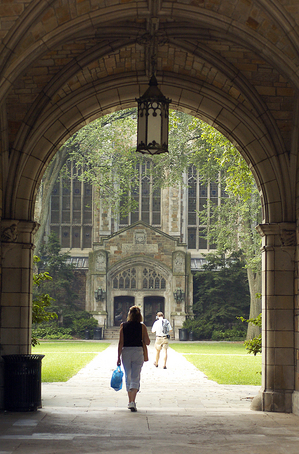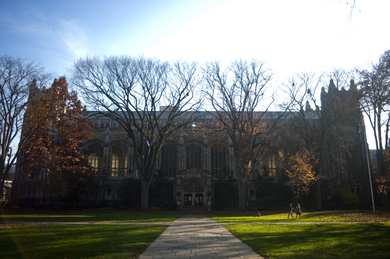Undeterred by declining applications, University of Michigan Law School keeps admissions practices same
While some law schools are choosing to cut their class sizes due to souring job prospects and declining applications, it's business as usual for the University of Michigan Law School.

University of Michigan's law quad
"We haven't had difficulty in getting students jobs. We don't feel that we have any need to cut the class size," she said in an interview.
Applications for the fall class are down 3 percent over applications for the fall 2012 class. That year, applications were down 7 percent, and for the fall 2011 class applications were down 10 percent.
The decline came on the heels of a 16-percent spike in applications in 2010.
During a typical year, the law school expects 5,500 applications. This year it received roughly 5,000, according to Zearfoss.
Nationally, applications to law schools this year are down 20 percent. Since 2010, applications have declined an estimated 38 percent.
During the past two decades, U-M's average class size has been 360 students. Recent class sizes, however, have fluctuated. Three years ago, the entering class size was 376. The next year it was 359 and most recently it was 344.
With law school applications down nationally, qualified applicants applying to top schools are achieving a higher rate of acceptance. Students who before might have chosen from three or four potential schools are now choosing from six or seven.
"We make roughly the same number of offers every year," Zearfoss said. "Last year was a slightly smaller yield, which was not our intent but not wholly unexpected by us."
Zearfoss said the school is expecting a somewhat smaller yield again this year.
Due to fewer applications and lower job placement rates, some law schools, including Northwestern University and George Washington University, are actively cutting class sizes.
"Northwestern has not faced the same level of decline (in applications) as other schools, nor have we suffered as greatly from the decline in legal positions as most other law schools," Northwestern law school Dean Daniel B. Rodriguez wrote in an email in early March. "We are not immune, however. And we are not going to ignore the ways in which the legal economy affects our alumni, current students, and prospective students."

The Law Library on the Central Campus of the University of Michigan.
Joseph Tobianski | AnnArbor.com
U-M's law school doesn't plan to follow suit.
The school considers its decline in applicants modest, and figures show that recent graduates aren't having trouble finding employment.
U-M reports that 95 percent of its 2011 law graduates are employed. That's significantly higher than the national 55-percent employment rate for 2011 law graduates, as reported by The Wall Street Journal.
"If we were having trouble identifying enough people to make offers to that we thought are the caliber of students we want to see, we would make fewer offers. That's not the case. We're not having any difficulty," Zearfoss said.
Zearfoss said the school is monitoring trends closely.
"The last few years in legal economy has been full of surprises," she said. "We're going to keep our eye on it."
Kellie Woodhouse covers higher education for AnnArbor.com. Reach her at kelliewoodhouse@annarbor.com or 734-623-4602 and follow her on twitter.


Comments
ordmad
Mon, Apr 1, 2013 : 10:38 p.m.
For the class of 2011, there is known employment data on 378 of the 379 graduates at 9 months out. 299 had jobs that required a law degree, 44 had jobs where a law degree was an advantage (think business, etc...), 11 had "other professional" jobs, 1 had a nonprofessional job, 4 had job types "unknown", 2 were seeking advanced degrees, 4 were unemployed and not seeking work, and 13 were employed and "seeking." Those are the facts. Now have a sensible discussion. http://www.law.umich.edu/careers/classstats/Pages/employmentstats.aspx
Angry Moderate
Mon, Apr 1, 2013 : 5:18 p.m.
The 95% employment number is complete BS. That includes part-time jobs. That includes temporary jobs, like internships that only last one year. That includes jobs that do not require (or even prefer) a law degree. That is a totally different measurement than the one in the WSJ article--they cannot be compared to each other. Most interestingly, the 95% includes graduates employed by the school. Law schools know that they are ranked according to the percentage of students who are employed within 9 months of graduation--so they give students who are unemployed at graduation a made-up job at the school that conveniently lasts around 9 months. Law School Transparency, run by a law professor, provides a real employment score of 82.5% for U of M: http://www.lstscorereports.com/?school=michigan Note that the total cost is $250,000. A quarter of a million.
David
Mon, Apr 1, 2013 : 10:34 p.m.
How does the 82.5% figure compare with percentages from the past? Without that information this still doesn't tell us much. I'm not disputing that employment prospects have decreased, etc. which has become common knowledge. But those studies are including all law school graduates. Students from elite schools aren't nearly as affected by this as others.
Solitude
Mon, Apr 1, 2013 : 3:49 p.m.
Michigan offers a 95 percent "employment" level for graduates, where the WSJ reports a national 55 percent employment rate. It would be interesting to learn if UM counts law school graduates who are employed in non-legal fields in their employment figures, and whether the WSJ did, as well.
Dirty Mouth
Mon, Apr 1, 2013 : 3:28 p.m.
A law degree isn't what it used to be.
John of Saline
Mon, Apr 1, 2013 : 2:47 p.m.
Fewer lawyers = good thing.
JRW
Mon, Apr 1, 2013 : 1:46 p.m.
The arrogance of UM continues. No problem! Do you actually think they would admit if there was a problem placing those Law grads? No. That 95% job placement rate cited does not specify the kinds of jobs these grads are getting. All around the country, law grads are having more and more difficulty finding high paying law jobs, and while UM may be placing a percentage of grads in those kinds of jobs, it's likely many are taking lower paying law jobs and some in non law fields. UM would never admit that. It's bad PR.
JBK
Tue, Apr 2, 2013 : 3:02 a.m.
Ignatz - I happen to work with a lady who is a Snr Proj Mgr. Her law degree (to date) was a total waste of time and money.
ordmad
Mon, Apr 1, 2013 : 11:43 p.m.
Check the facts further down. Facts first, assertions second please.
David
Mon, Apr 1, 2013 : 10:16 p.m.
I'm no law student, but it seems like there shouldn't even be a question that students from a top 10 law school can still get great jobs. The majority of law students don't go to an elite school, and I imagine those are the ones having problems finding the same types of jobs available in the past.
Angry Moderate
Mon, Apr 1, 2013 : 5:19 p.m.
Claire, of course your friends who got biglaw are the ones who are outspoken about their job prospects. The people who don't do so well at on-campus interviews just keep their mouths shut--or even lie because they're embarrassed about being unemployed.
easy123
Mon, Apr 1, 2013 : 4:36 p.m.
We should first ask them - " What did they build?" - tongue in cheek of course!
Claire
Mon, Apr 1, 2013 : 3:55 p.m.
I am a student at UM Law, and almost all my friends who wanted biglaw jobs in Chicago/New York/Boston etc. got them. These are incredibly well paying jobs that start at 160k. I am a public interest student and my job prospects are looking very good as well. And the employment data from UM Law reflects my experience.
Ignatz
Mon, Apr 1, 2013 : 2:20 p.m.
So, what kinds of jobs are they getting?
A Voice of Reason
Mon, Apr 1, 2013 : 1:22 p.m.
Maybe the cost of law degrees vs. benefit is finally catching up. MBA applications are down too. Invest that $200,000 in a small business or the market when you are 20 years old and you may be way ahead in the long run.
Dog Guy
Mon, Apr 1, 2013 : 1:13 p.m.
A competitive football team and the largest stadium in the cosmos shine glory on the University of Michigan Law School, attracting wealthy students and generous alumni. Three factors control the worth of that law degree: location, location, location. Those wanting education choose the Thomas M. Cooley Law School.
Macabre Sunset
Mon, Apr 1, 2013 : 3:34 p.m.
Well, it is April Fool's Day.
halflight
Mon, Apr 1, 2013 : 3:05 p.m.
Now THAT'S funny.
norainnorainbow
Mon, Apr 1, 2013 : 12:31 p.m.
The building in the second photo is not the law library. The library is actually underground. That is the Legal Research building and it houses the Reading Room.
Mark
Mon, Apr 1, 2013 : 11:40 a.m.
Blame it on UM Alum Anne Coulter, as she is a product of the UM Law School.
halflight
Mon, Apr 1, 2013 : 3:04 p.m.
No, blame it on Cooley Law School that cranks out graduates with questionable job prospects. Michigan is one of the top ranked law schools in the country, and as long as there is any demand for lawyers, Michigan students will continue to find employment. Not so true for the other law schools in Michigan.
cookiemom
Mon, Apr 1, 2013 : 12:31 p.m.
Yeah, I'm sure that's it.
Susan Montgomery
Mon, Apr 1, 2013 : 11:03 a.m.
Just a typo, first sentence - "prosepcts"
Kellie Woodhouse
Mon, Apr 1, 2013 : 11:08 a.m.
Thank you for noting. I am fixing.